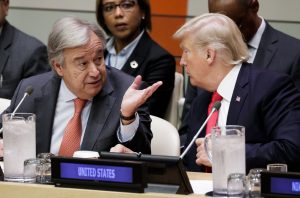
United Nations, Sep 18 (EFE).- The United States President’s speech at the UN General Assembly in New York on Tuesday, will be philosophical, but it will include clear criticisms of the countries he is most concerned about: North Korea, Iran and Venezuela, the White House announced Monday.
Donald Trump’s speech at the UN General Assembly will focus on explaining how his “America First” approach, which is an apparent isolationist policy, fits in with his call for greater international cooperation on issues such as the fight against terrorism.
The speech will also “represent the president’s vision and declaration to the countries of the world about how America sees the world, how America operates, what its values are and how it relates to other countries,” a senior US official who asked not to reveal his identity said, adding that it will be a “profoundly philosophical address.”
The official said Trump will address how his “America first” principle is “consistent with the goal of international cooperation,” because “all countries that are sovereign put the needs of their own citizens first.” .
In addition to global cooperation, Trump will discuss other specific challenges, including the crisis in Venezuela, during a dinner with several Latin American leaders on Monday.
Terrorism will be another focus of his speech, and so will the missile tests in North Korea and Iran’s activities in the Middle East, the senior official said.
Trump “will appeal to other nations to do their parts in confronting the threats and understanding that these are a shared menace and that nations cannot be bystanders to history and that if we don’t confront the threats now they will only gather force and become formidable,” said the official.
The president, who has recently lowered his criticism of the UN but insists on the need to reform the organization, will remember in his speech that this institution “was conceived with the idea of bringing together independent nation states to cooperate together,” said the official.
Trump will therefore argue that “Countries that confront common dangers, common threats and common opportunities ought to be able to cooperate together as a coalition of strong, free, and independent nations in a way that uplifts all of their citizens.”
